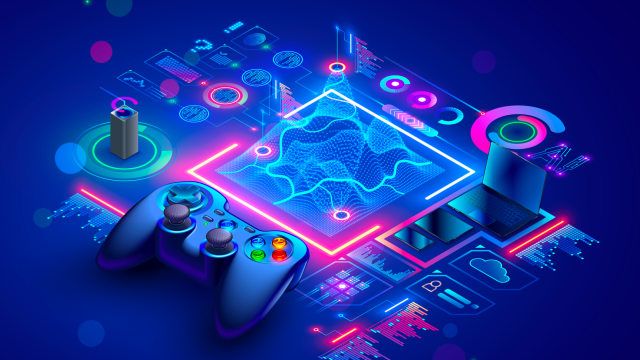
We tend to know quite a bit about large developers. Due to their sheer size and prowess, there’s a cornucopia of information floating around the internet about huge players like Square Enix or Activision, by virtue of interviews, news articles, press releases, documentaries, blogs, tweets, fleets, stories — you name it.
This fairly rich tapestry of data combines to form a fairly comprehensive mosaic of what the big studios are up to, and gives at least a hint of what is going on behind their hallowed walls. But what of the smaller devs? They rarely get the same level of spotlight. So we reached out to Aussie game developer Gemma Fitzgerald to help clear some of the mist.
Gemma grew up in regional Victoria playing video games and dreaming of making her own. After spending two years completing her bachelor’s in design at JMC Academy, she’s now doing just that — while also pursuing further study through JMC’s Master of Creative Industries.
Through her Master’s program, which specialises in gaming, she is creating a story-driven episodic horror/thriller in which players take control of both a non-binary detective and an ambiguous murderer. Let’s find out more.
Kotaku: Hey Gemma, tell us about the game you’re working on
Gemma: Our game is a story-driven episodic thriller game in which players will get to take control of both the protagonist and the antagonist. The protagonist of the game is a non-binary detective who is trying to uncover the identity of the game’s antagonist, a mysterious murderer who always seems to remain just out of reach.
It will be a single-player game and be set in third person. The main mechanics will be point and click as players will need to explore the scenes to uncover clues and other hidden interactions, these clues will unlock various choices, dialogue options and even some non-playable character interactions that will help determine one of the game’s endings.
What do you hope to achieve by putting this game out there?
My vision is to inspire people so that they can be who they are meant to be without fear. Fear is something that holds many people back in life, it prevents people from reaching their fullest potential, and from expressing who they truly are. It is something I had to learn to overcome as both a creative and a gender-fluid bisexual woman.
I am very passionate about my vision, and I want to help others realise that they can live their truth without fear and to do that I want to use my various skills to tell inspiring and compelling stories about LGBTQI+ characters by representing them in my game so that people who have never had a character to relate to may finally have one.
Sounds very cool. How many people are on the team?
Currently, only two people are on the team but as we move into the production phase of the game, we will be looking to bring more people on board.
What are the advantages of making a game in such a small team?
One of the biggest advantages is that we have full creative control over the game. We get to create something we want and that something can be an idea or a story that we want to share with others, or it can be something we wish we could play but doesn’t exist — so why not make it exist. The freedom of creative control also gives us the freedom to choose a niche target audience such as LGBTQI+ gamers, or even more specifically the transgender and non-binary community.
Another amazing advantage is the friendships you develop with your team. Being in a small team allows you to form better and more personal friendships which allow for more open and honest feedback, as well as easier more relaxed brainstorming sessions. The same thing can be said for connecting with your community — when you’re a smaller team and you only have a small community it’s easier to talk and interact with that community which allows them to feel seen and heard. It also allows us as a team to hear their feedback and what they love or dislike about something, or even stuff that they may like to see in future projects.
What do you find the most challenging about making games?
There are a lot of challenges when it comes to making games with a small team. In my case, because I’m still studying, it can be challenging to learn new skills on the spot! A lot of us are just starting out and still have a lot to learn which is both a daunting but fun part of the learning experience. This also means that a lot of projects will take a lot longer to develop because we are also still developing our skills and trying to secure funding which is not always that easy to come by especially for small, brand-new game developers. That’s why the JMC Masters course not only focuses on giving us the skills to bring our projects to life but also the knowledge on how to market, get funding for and sell our finished projects on completion of the program.
Although it is easier to connect to your community, it’s not that easy to build one. Although social media offers us a lot of different platforms, we still have to learn how to navigate the different algorithms to reach our target audience and stay relevant once we do. Due to how far games have come over the years, the expectation for them has significantly grown, which in turn puts a lot of pressure on us to make high-quality games at a similar speed to that of larger game studios. With a small team, quality takes time.
What made you want to get into making games?
I have always loved games; I have been playing them for as long as I can remember and I never grew out of them. My favourite kinds have always been story-driven games, platformers, and open-world adventure games. Being able to escape into a new reality even if it’s only for a bit has been something I always cherished about games.
My love of games is not my only inspiration for wanting to make games, as a queer woman I grew up playing games and never experienced characters who were like me, which made me feel like an outcast, or like I wasn’t normal. Representation has become something I am extremely passionate about; I want to increase representation for the LGBTQI+ community in the gaming world so it can not only be normalised in society, but also so current and future generations can feel seen and heard, rather than ignored.
How has the course you’re doing prepared you for game dev life?
The master’s course I am doing allows me to kick start a creative project by pairing me up with a mentor to bring my project to life whilst teaching me about the creative industries as a whole. So far the course has helped me to solidify what it is that I want to do for a career, as I still wasn’t sure when I started twelve months ago. I have gained more extensive business skills and am learning how to build a brand that represents my values and my vision.
I am surrounded by amazingly creative people in this course. Hearing their projects and passions is very inspiring, and getting to collaborate with them and exchanging feedback through brains-trust meetings has been one of the best experiences. I get the chance to learn about creative fields I have never stepped foot in, which is very beneficial when it comes to networking. I also get to pitch my ideas to my peers and get to hear their pitches, which gives me the chance to better my skills with how I pitch things through their feedback.
What do you reckon is the most important thing you’ve learned so far?
My time at JMC has taught me that it is never too late to follow your dreams, and you shouldn’t leave them to be dreams when you can make them a reality.
What advice do you have for other budding game devs out there?
If you really believe in something then do it, and make sure you believe in yourself just as much as you believe in your project, whatever it may be. One other piece of advice — if you wish there was a game about something and it doesn’t exist, then make it exist. You never know who else may want to play a game just like the one you are wishing for.
Are you excited about the future of the Australian games industry?
I am excited to see an increase in LGBTQI+ representation within the Australian and wider international scene. I think it would be so exciting to see the Australian game industry help pave the way towards equal representation for the LGBTQI+ community and other minority groups that currently don’t get the representation they deserve.
Since indie games make up the majority of the Australian game industry, I’m excited to see what increased funding and publicity will do for all the small creators, and I hope they will continue to create amazing fun games that inspire the next wave of creators.

Leave a Reply